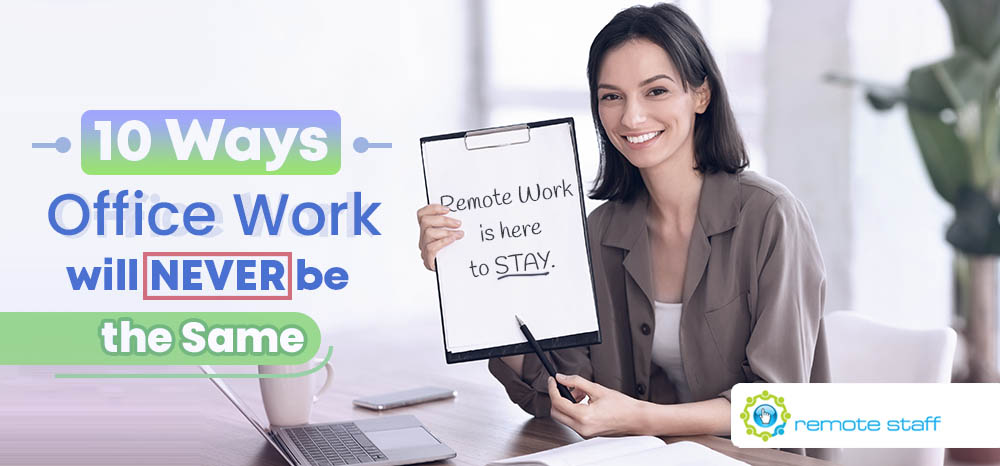With the rollout of vaccines, the world is tentatively trying to go back to normal. Business establishments are reopening, albeit with limited capacity for diners and shoppers. Some companies are now requiring some employees to report to the office after a year of remote work.
Despite these developments, it will be a while before we can start to attend concerts, parties, and outdoor gatherings again. But some things will never be the same. Take the nature of work as we know it, for example:
1. Remote work is here to stay.

Many countries are already vaccinating their citizens with the goal of achieving herd immunity (and some semblance of normalcy). But even though going back to the office is possible for more and more people, many will still opt to work from home due to convenience, safety, and flexibility.
Of course, many companies may develop a hybrid model that allows employees to have the option to work from home or at the office as they see fit. At this point, however, it’s safe to assume that many will choose the former.
2. The boundaries between work and home will get blurrier.

Prior to the pandemic, most employees could only dream of work-life flexibility. These days, we can basically get things done from just about anywhere. Admittedly, many of us are grateful for it.
On the flip side, we’re now all too familiar with the stress from constant Zoom meetings and the resulting lack of personal and professional boundaries. Thus, it’s important for companies and employees to set and respect boundaries moving forward.
3. WFH will not be an option for everyone.

Millions of high-skilled employees transitioned to remote work when the pandemic began. It was a relatively easy shift since their job responsibilities were compatible with online working platforms and the overall nature of remote work.
However, remote work will never be an option for low-skilled workers. Thus, those who work in manufacturing and service industries will still need to work onsite.
4. We will use offices differently.

In the near future, offices will continue to exist for employees who want to do collaborative work – or simply want a change of scenery. But instead of segregated work desks, the modern office would feature open spaces which anyone can use.
Conference rooms will also evolve to encourage more interaction between those who are in the office and their WFH counterparts.
5. The freelancing industry will grow.

The global pandemic leveled the playing field, especially for freelancers. Now that many companies have realized significant cost savings that come with outsourcing, freelancers will have more opportunities, a lot of which will be location-independent.
6. Communication will be more asynchronous.

Let’s admit it. Very few, if any, enjoy constant Zoom meetings. And since distributed teams will be the norm pretty soon, there is a clear need for asynchronous yet effective communication. Hence, communication platforms like Slack and Microsoft Teams developed software that address this need.
7. Productivity standards will change.

Critics were skeptical about just how productive a work from home set-up could be. However, this was debunked early on as companies reported an increase in employees’ performance and output during the lockdown.
We used to measure employee productivity by the number of working hours rendered in the office. Today, it’s based on high-quality results delivered within the given time frame. This will likely continue as the norm before long.
8. Cultivating company culture will be harder.

It’s harder to form camaraderie with your online team. That’s a fact. There aren’t any opportunities for water-cooler chats or after-office happy hours. It’s also more difficult to facilitate team building opportunities and doing it virtually can even be counterproductive.
Creating an inclusive company culture is more difficult when interactions are limited to video calls, which can be awkward and formal. Hence, management teams should exert more effort in fostering camaraderie amidst their teams.
9. We will seek more humane connections at work.

Back when most of us showed up to the office, there were more opportunities to encounter people during the commute or to interact with colleagues face to face. We could do without the commute, clearly, but there’s no substitute for in-person interactions.
Thus, it’s been more acceptable to communicate a little more informally at work. Emoji’s aren’t the most accurate way of expressing human emotions, but they’ll have to do until it’s safe to congregate again.
10. Many of your colleagues will relocate.

Living in a big, densely populated area can increase your chances of catching the virus. How many of your colleagues or employees have moved out of their city apartments as a result?
And with remote work being increasingly mainstream, you can bet that more people will move away from the city to live in less crowded (and cheaper) locations.
Managing a remote team will always come with unique challenges, but with the right partner, you won’t have to handle them alone.
Remote Staff has been assisting Aussie SMEs and entrepreneurs with finding top Filipino remote workers who can help them grow their business. Whether you need a virtual assistant, copywriter, or graphic designer, you’re sure to find them in our rich talent pool and we’ll give you enough support to ensure that your working partnership proceeds as smoothly as possible.









